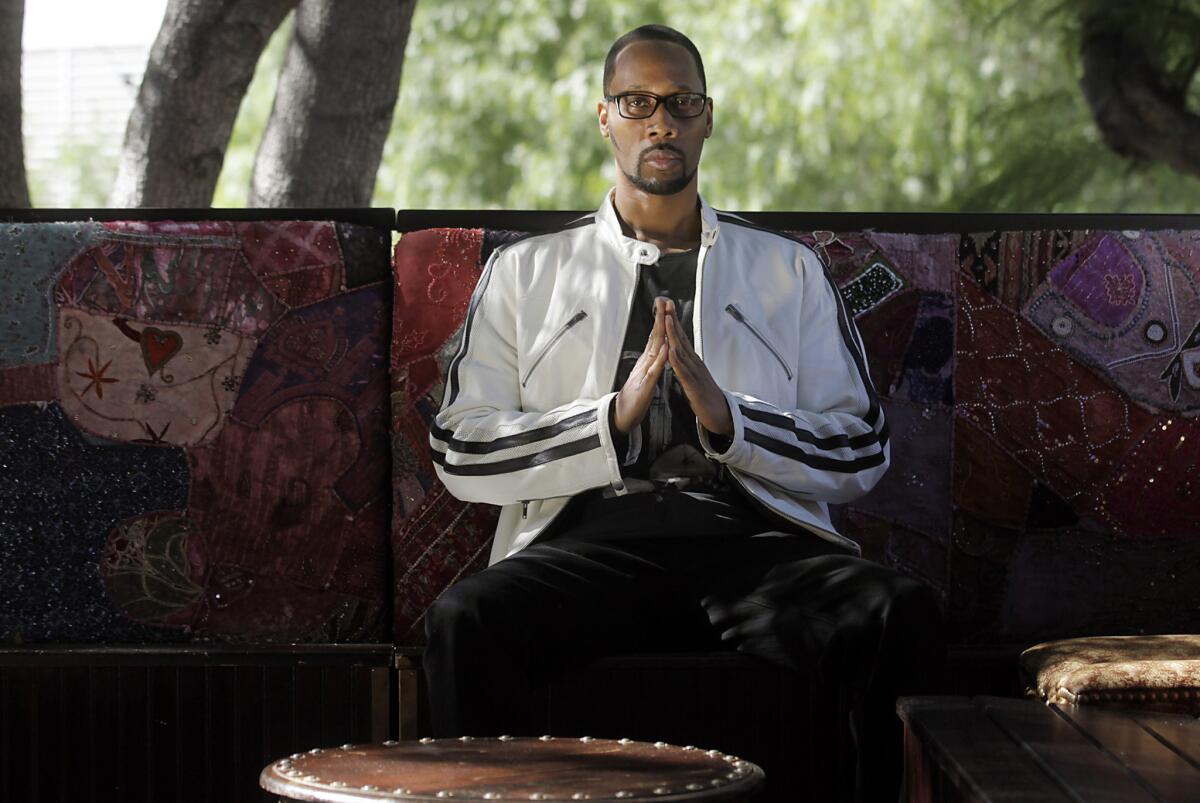SXSW: RZA connects the dots between film and music

- Share via
It’s long been known that Wu-Tang Clan principal architect RZA has a love of kung fu films and the work of John Woo. It’s right there in the group’s name and its musical samples, not to mention RZA’s own directorial debut, “The Man with the Iron Fists.”
But speaking Monday at the South by Southwest interactive and film conference in Austin, Texas, RZA pulled back the curtain on his musical and cinematic heroes, revealing that his first love was none other than “Star Wars” Jedi Obi-Wan Kenobi.
“Star Wars,” said RZA, was the first film he remembers seeing, taken to the theater by his uncle. A young RZA was drawn to Obi-Wan because he’s “a deep, spiritual guy.”
FULL COVERAGE: South by Southwest
During the 45-minute session RZA talked about his experiences in the film industry, illustrated that nepotism can come from unexpected places and attempted to connect the dots between the films of his youth and the music that made him famous. Movies such as the late ‘70s killer bee horror film “The Swarm” and Bruce Lee flick “Fury of the Dragon” left a permanent mark.
“You’ll notice that those early films are my music,” RZA said. If you look at the ‘Swarm,’ Wu-Tang was called the Killa Bees. You’ll see there was a subconsciousness of that film that got embedded in me. When you look at ‘Star Wars’ or the martial arts films -- the sword swing or the lightsaber swing -- and then Wu-Tang being a sword-style of lyricism, you see that all these different films have guided me, informed me, molded me and helped me find my artistic expression to music that [was founded] on film.”
RZA compared the work of a film director to that of a hip-hop artist, saying both are sampling from past art. Early Wu-Tang works, for instance, featured snippets of Woo’s “The Killer,” and RZA noted that “Star Wars” is largely a sample of the work of Akira Kurosawa.
“Directors are samplers,” RZA said. “Film is their medium of sampling. I used a sampler to sample old beats and movie clips. They use films in their minds to sample old ideas.”
How past works shape an inform an artist’s repertoire is a center of debate today, thanks to the trial over Robin Thicke’s “Blurred Lines,” and RZA spoke of influence as a collection of experiences.
“When something goes into you,” RZA continued, “it matures itself and it comes out of you. I was able to recognize that later in my career. When I was doing Wu-Tang I didn’t really recognize that. It was just ideas popping and popping. It took me some time to go back and reflect and say, ‘Wow, that came from my uncle taking me to see films.’”
Though RZA said Wu-Tang albums were attempts to make cinematic works, his journey into the film business needed a little luck. He met with Woo as a precaution, largely wanting not to get sued for sampling “The Killer,” and showed up hours late for a 6 p.m. dinner.
In the late ‘90s he met with Jim Jarmusch, who wanted RZA to score “Ghost Dog: The Way of the Samurai.” The two almost didn’t meet, but it turns out they had a mutual friend.
“He couldn’t find me,” RZA said. “He didn’t know how to find me. There was a guy who knew us both, and he was the guy we bought weed off of … This guy brings Jim to my office.”
The latter half of the talk focused on RZA’s mentorship with Quentin Tarantino and work on “The Man with the Iron Fists.” The original cut for the latter, RZA said, was about three hours. Told to trim it, he walked out of the editing room. Cooler heads prevailed.
“That’s the hardest thing for any artist,” RZA said. “You think what you’re pimping is a part of you, is a part of the story you went to tell. But you’re not doing it for yourself. You’re doing it for an audience ... You have to keep their focus. It’s hard to keep people’s focus. You have to find a way to streamline.”
RZA told the audience to never stop learning. He said these days he’s studying science books and the works of Woody Allen, although he was quick to add that he has to “try not to think about his personal life.” He encouraged attendees to use books as maps, and find inspiration in everything from film to video games.
‘If you look at me, a guy who started off as a kid with lyrics about girls with big breasts, to a guy who would go hang in the record stores and buy records and scratch them up, even a guy who would try to write his name on walls in graffiti, all these were different expressions of art. It’s a wavelength.”
We’re at South by Southwest until March 22. Join us at latimes.com/sxsw for ongoing coverage of the festival.
More to Read
The biggest entertainment stories
Get our big stories about Hollywood, film, television, music, arts, culture and more right in your inbox as soon as they publish.
You may occasionally receive promotional content from the Los Angeles Times.











